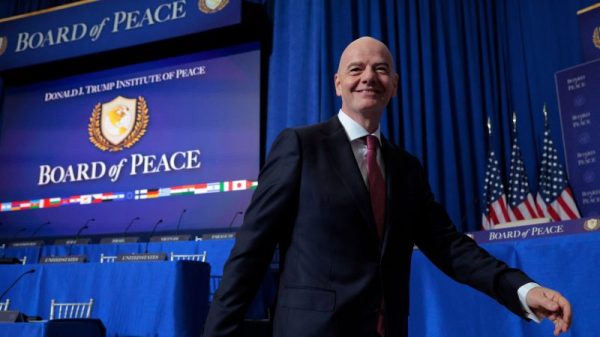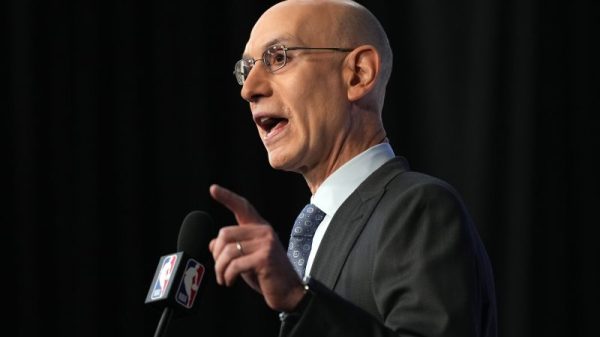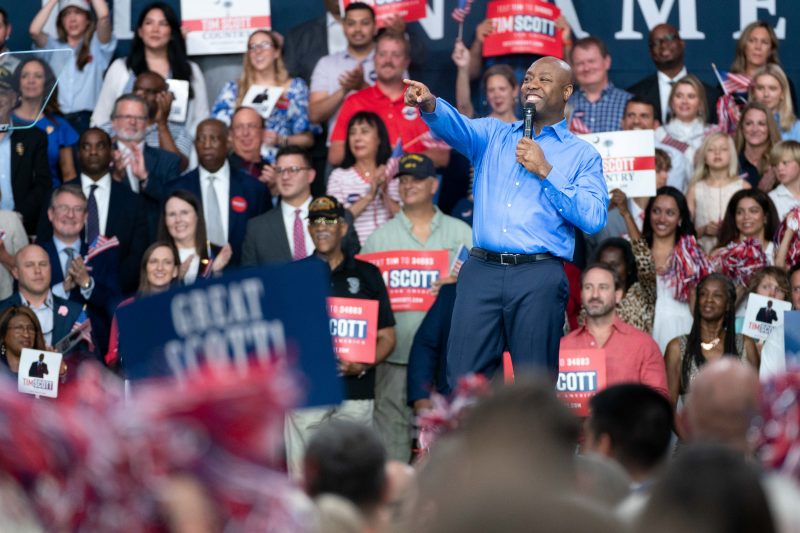NORTH CHARLESTON, S.C. — Sen. Tim Scott, one of the country’s most prominent Black Republicans, kicked off his presidential campaign here Monday, highlighting his biography and Christian faith, while also attacking President Biden in a speech that set him apart from some rivals in tone and content.
Speaking to a packed gymnasium, Scott invoked scripture and at times adopted the tone of a preacher, asking the crowd for an “amen” and “hallelujah,” as he walked around a stage with a handheld microphone. In a speech that sought to hit uplifting notes, he described himself as a “kid raised in poverty” who went on to serve in Congress and warned of a nation “retreating away from patriotism and faith” under Biden.
“I will be the president who stops the far left’s assault on our religious liberty,” Scott said, without getting into specifics. The remark drew loud applause.
While he repeatedly assailed Biden, Scott made no mention of his Republican opponents, including former president Donald Trump, the clear polling leader in the GOP race. His allies don’t expect him to spend much time talking about the former president, at least in the early days of his campaign. Scott also did not directly criticize the direction of his party, as some of his rivals have done.
The latest entrant into the growing primary field, the South Carolina Republican is betting that emphasizing his faith, his personal story and a more optimistic message than other GOP hopefuls, while hauling in significant campaign cash, will be enough to carry him to the Republican nomination. But he begins polling in the single digits, well behind Trump and Florida Gov. Ron DeSantis, who is also slated to enter the race this week and is running second.
“There’s a lane out there. We’re going to figure out how wide that lane is, for somebody who represents an inspirational, aspirational message,” said Sen. John Thune (R-S.D.), the second-ranking Senate Republican who led the opening prayer at Scott’s event and is supporting his bid.
Others, however, argue that Scott will need to take Trump on more directly to be successful, and question how much his campaign will resonate in a party where anger has fueled the rise of Trump and DeSantis.
“The key question for me is, are you prepared to tell Donald Trump to shut the hell up and get out of the race?” said Michael Steele, a former Republican National Committee chairman and vocal Trump critic. “If he’s not ready to take on Donald Trump, then he’s not ready to be president.”
Scott launched his campaign at Charleston Southern University, his alma mater, with some high-profile Republican support. Larry Ellison, co-founder of Oracle and a major GOP donor who has financially backed Scott, also attended Monday’s event and received a shout-out from Scott in his remarks.
The South Carolina senator starts the race with $22 million from his Senate campaign and has already made a $5.5 million ad buy in Iowa and New Hampshire that will run through the first GOP debate, scheduled for August. Ahead of Monday’s announcement, senior campaign officials touted Scott’s fundraising prowess, saying they think he has enough resources to be on air from the day he announces until the New Hampshire primary starts.
The officials also highlighted his conservative record, including top ratings from the National Rifle Association and Susan B. Anthony Pro Life America. They argued that Scott is the most consistent conservative in the race, while also noting that Republican primary voters in South Carolina recently supported his 2022 Senate reelection.
Scott’s speech hit on many of the themes that have energized the Republican base. He drew an enthusiastic response from the crowd when he criticized the Biden administration’s policy at the southern border and vowed to “build the wall.” He also pledged to pursue a “Made in America agenda” and said the country should stop “canceling our Founding Fathers and start celebrating them.”
In addition, Scott, who unsuccessfully attempted to reach a bipartisan policing overhaul in the Senate with Sen. Cory Booker (D-N.J.), also pledged to “back the blue” and “make it a federal crime to kill, ambush, or assault a cop in this country.”
Scott is the only Black Republican senator and at the moment is poised to be the only senator to enter a presidential race that’s set to include a former president, governors and a former vice president. He reiterated his belief that the United States is not a racist country — a view that is widely shared among many conservatives who have rejected the notion that institutions are plagued by systemic racism.
“For those of you who wonder if America is a racist country, take a look at how people come together,” he said. “All of God’s people come together. Black ones and White ones, and red ones and brown ones working together.”
While Trump’s rallies tend to focus heavily on his grievances and DeSantis has often boasted that Florida is “where woke goes to die,” Scott, who has talked of his vision for “a new American sunrise, even brighter than before,” used more personal touches on Monday meant to evoke positive feelings. He thanked his mother and invited her onstage, presenting her, along with the widow of his mentor, John Moniz, with flowers before his remarks.
But some Republicans are skeptical about such appeals.
“Nothing would make me happier than a message of optimism resonating in today’s Republican Party,” said Joel Sawyer, a South Carolina-based political consultant. “Whether voters want to hear it or not is a completely different matter. All evidence points to grievance politics selling and working.”
At the same time, Scott has also shown a willingness to campaign in more combative tones — which showed up in Monday’s speech. He has accused Democrats and liberals of pushing a “blueprint to ruin America.” And in a video earlier this year announcing his intent to formally explore a run, Scott said he is uniquely suited to reject the “culture of grievance” and “victimhood” he said has been fostered by Biden and “the radical left.”
Scott has previously referenced some of the more hypercritical social media backlash he received after delivering the GOP response to Biden’s first address to a joint session of Congress in 2021. He voiced a similar message on Monday.
“I’m the candidate the far left fears the most,” Scott said Monday. “When I cut your taxes, they called me a prop. When I refunded the police, they called me a token. When I pushed back on President Biden, they even called me the n-word. I disrupt their narrative. I threaten their control. The truth of my life disrupts their lies!”
Scott has been selective about when he has decided to speak up on racial issues within the GOP and on Monday he did not bring up the topic. During the Trump administration, he helped sink two judicial nominees over their views on race. He also met with Trump after the former president said there were “very fine people on both sides” following a white nationalist rally in Charlottesville, Va., that became violent.
On Truth Social, Trump wished Scott “good luck” and described him as “a big step up from” DeSantis, who he went on to criticize. Trump also highlighted his work with Scott on opportunity zones, Scott’s signature legislation which offers tax incentives for wealthy individuals to invest in low-income areas.
In addition to Trump and DeSantis, Scott faces fellow South Carolinian and former U.N. ambassador Nikki Haley. Several others are also considering entering the race, including former New Jersey governor Chris Christie and former vice president Mike Pence, who is expected to announce in June.
Chandler Caulder, a 21-year-old from Camden, S.C., who attended the Scott event, said he previously supported Trump but that “it’s time for a change.”
“My father’s a big Trump supporter and he didn’t want me coming down here today,” Caulder said. “And I was like no, we need a change. We need somebody to go out there and we need to rebrand the Republican Party.”
Although he only filed official paperwork Friday, Scott has effectively been running for president for some time. In April, he announced the formation of a presidential exploratory committee, which allows candidates to raise money and travel before officially entering a race. He has also been traveling for months to Iowa and New Hampshire as part of his “Faith in America” listening tour.
Shortly after his exploratory committee announcement, Scott struggled to answer specific questions about abortion restrictions. While he said he would “sign the most conservative pro-life legislation that they can get through Congress,” he added: “I’m not going to talk about six or five or seven or 10.” Scott, however, has said he would sign a 15-week national ban. In his speech, Scott did not delve into the specifics of abortion laws.
Thune said Scott will need to figure out “how to connect with that voter who perhaps liked the former president’s policies or maybe one of the other candidates but is looking for somebody who has a tone and temperament that’s optimistic and hopeful.”
“He speaks to that part of the electorate that Republicans have been losing in the last couple of elections,” he added.
Dylan Wells contributed to this report.



























